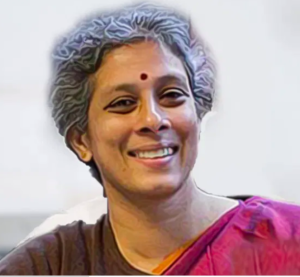Sujatha Ramdorai – Algebraic Number Theorist

Professor Sujatha Ramdorai is a perfect example of a woman who pursued her passions and achieved success. Inspired by her grandmother who constantly emphasized the value of education, Professor Ramdorai developed an acute desire to learn at a very young age. She was in primary school when she discovered her love for mathematics, perhaps knowing all along that this was the field she would one day pursue.
Upon finishing high school, she struggled to make a decision between engineering and pure science for her higher education. However, after speaking to seniors, she realized that her love for abstract thinking made mathematics her true passion. Professor Ramdorai completed her B.Sc. in Mathematics at St. Joseph’s College, Bangalore and then proceeded to do her M.Sc. with Annamalai University, completing her education with a PhD from the Tata Institute of Fundamental Research (TIFR) where she continued to work later as well. Over the years, she has been known for her extensive contributions to non-commutative Iwasawa Theory (for which she received the Srinivasa Ramanujan Prize!). Currently, she holds a Canada Research Chair at the University of British Columbia in Canada.
Professor Ramdorai was fortunate enough to face few stereotypes growing up. The school she attended employed several female teachers who were devoted to their job; they encouraged students who showed interest in studies, irrespective of the subject. She was also lucky to be in a family that was very encouraging and proud of her achievements in mathematics. After marriage, her husband continued to support her, and her grandmother helped look after the home and her daughter when she needed to focus on work or needed to travel.
In the workplace at TIFR, there was no active discrimination, but neither was there a recognition of the problems faced by the diverse student body. In Canada, where she works now, there are continuous ongoing discussions on equity, inclusion and diversity. There is an honest attempt to listen to a cross-section of voices and offer possible solutions that can transform the work environment. This is an area India needs to work on. Active encouragement of role models and meaningful conversations with diverse stakeholders are not just beneficial but necessary.
As per the role of women in science, Professor Ramdorai’s article in the book Lilavati’s Daughters by the Indian Academy of Sciences effectively articulates her views: “I am very conscious that in India, women have multiple contextual roles to play, and am also constantly struck by the fact that women do it with dexterity and ease, across sections of society! For women, a scientific career perhaps offers more flexibility in combining a career with a family life. Scientific policies could be shaped towards making them sensitive to the problems of women. I truly feel that there is a whole new world in science waiting to be discovered and claimed by women.”
To all the young girls wanting to pursue the sciences, Professor Ramdorai advises you to try to find mentors and people whom you can talk to. Today the internet offers tremendous opportunities for connecting and learning, so use them wisely to your advantage. Be passionate about your interests and don’t forget to read about role models and people who have overcome adversities to achieve their dreams.
